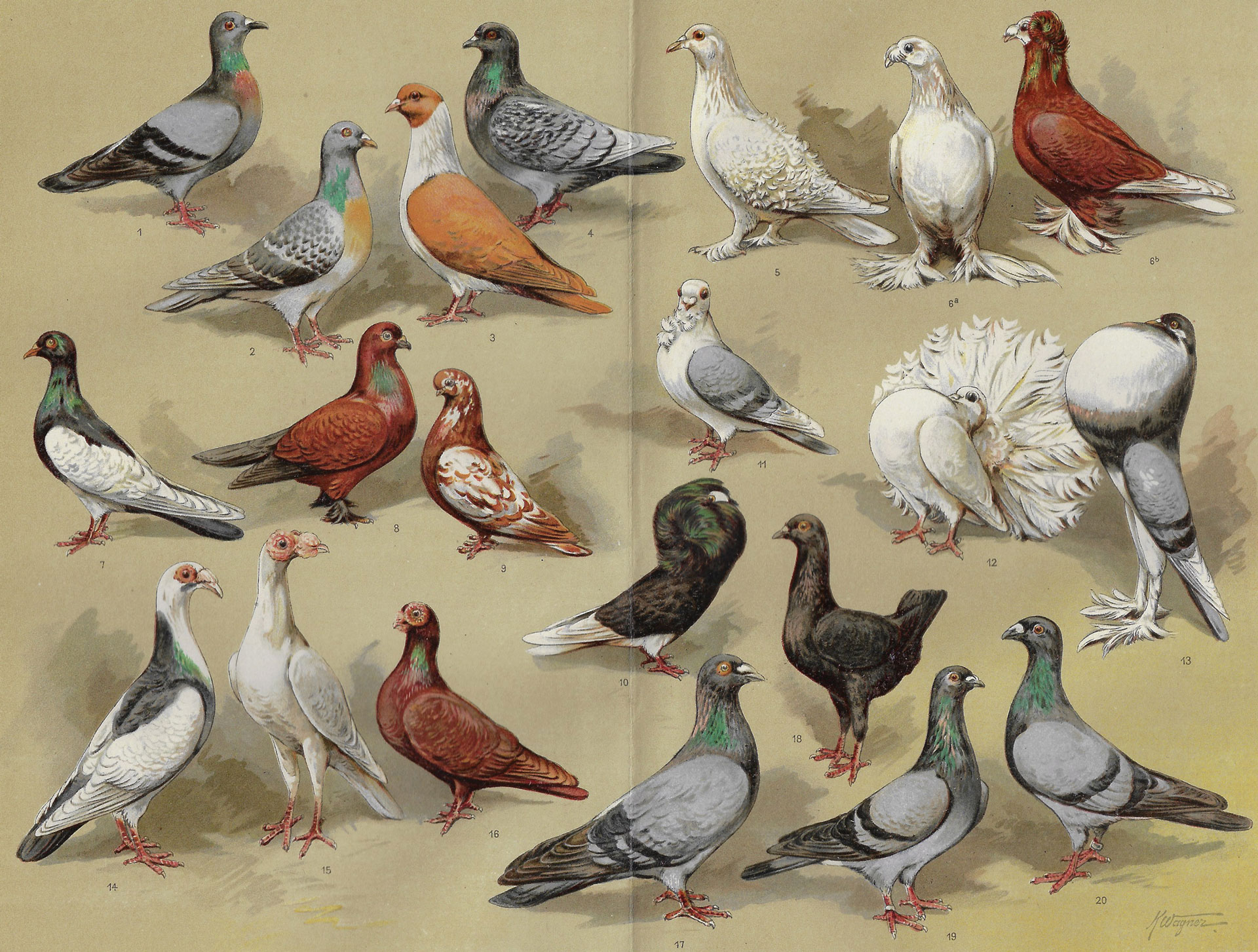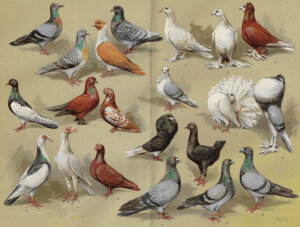How Long Do Archangel Pigeon Eggs Take to Hatch? Discover Now!
Archangel pigeon eggs usually take about 17 to 19 days to hatch. This period can vary slightly depending on various factors.
Raising archangel pigeons can be a fascinating hobby. These birds are known for their beautiful plumage and unique colors. Understanding their breeding process is crucial for successful hatching. Knowing the hatching time of their eggs helps you prepare better. It allows you to provide the right conditions for the eggs.
In this blog, we will dive deeper into the hatching process of archangel pigeon eggs. We will discuss the factors that can affect the hatching time and how to ensure healthy chicks. Stay tuned to learn more about these magnificent birds and their breeding journey.

Credit: en.wikipedia.org
Archangel Pigeon Egg Incubation
Archangel pigeons are a beautiful breed with unique characteristics. One important aspect of raising these pigeons is understanding their egg incubation process. Knowing how to properly care for the eggs can ensure healthy chicks. This section will explore the incubation period and the factors that affect it.
Incubation Period
The incubation period for Archangel pigeon eggs is around 17 to 19 days. This time can vary slightly based on several conditions. During this period, the eggs need consistent warmth and care. The parents play a crucial role in keeping the eggs at the right temperature.
Factors Affecting Incubation
Several factors can impact the incubation period of Archangel pigeon eggs. Temperature is a key factor. Eggs require a stable temperature of around 37.5 degrees Celsius. Any significant variation can delay or prevent hatching.
Humidity also plays a role in successful incubation. The ideal humidity level is about 55 to 60 percent. Too much or too little humidity can affect the development of the embryo inside the egg.
Another important factor is the health and nutrition of the parent pigeons. Healthy, well-fed pigeons provide better care for their eggs. This increases the chances of successful hatching. Stress and disturbances can also negatively affect incubation. Keeping the nesting area quiet and safe is crucial.
Lastly, egg rotation is vital. Parent pigeons naturally turn the eggs several times a day. This ensures even heat distribution. If using an incubator, manually turn the eggs at least three times daily.
Ideal Nesting Conditions
To ensure the successful hatching of Archangel pigeon eggs, creating the ideal nesting conditions is crucial. These conditions not only support the development of the eggs but also provide a safe environment for the parents. Below, we discuss the key factors that influence nesting conditions.
Temperature Requirements
Temperature plays a vital role in egg incubation. The ideal temperature for Archangel pigeon eggs is between 98°F and 100°F (37°C to 38°C). Maintaining this range is essential for the embryos’ development.
| Temperature | Effect |
|---|---|
| Below 98°F | Slow development |
| Above 100°F | Risk of overheating |
Use a reliable incubator to keep the temperature steady. Make sure to monitor the temperature regularly. Even slight variations can affect the hatching process.
Humidity Control
Humidity is another critical factor. Maintaining the right humidity levels ensures the eggs do not dry out or become too moist. The ideal humidity level for Archangel pigeon eggs is around 55% to 60%.
- Too low humidity: Eggs dry out and fail to hatch.
- Too high humidity: Eggs become too moist, risking bacterial growth.
Regularly check the humidity levels with a hygrometer. Adjust the incubator’s settings or add water as needed to maintain the ideal range.
Signs Of Healthy Eggs
Signs of healthy eggs are important to understand for successful hatching. Healthy eggs ensure that the baby pigeons develop properly and hatch on time. By knowing what to look for, you can better care for your Archangel pigeons.
Egg Candling
Egg candling is a method to check the health of pigeon eggs. This involves shining a light through the egg to see inside it. You can use a small flashlight or a special egg candling device.
Healthy eggs will show clear signs of development. You should see a dark spot, which is the embryo, and some veins. If the egg is clear or has no veins, it might not be fertile.
Growth Indicators
As the egg develops, there are signs you can look for. The embryo grows bigger each week. You will see more veins and a larger dark spot.
By day 14, the embryo should fill most of the egg. Any odd colors or smells can mean the egg is not healthy. A healthy egg will have consistent growth and a developing embryo.

Credit: www.youtube.com
Common Incubation Problems
Incubating Archangel pigeon eggs can be challenging. Many breeders face common problems during the incubation period. Understanding these issues can help improve hatch rates and ensure healthy chicks.
Infertile Eggs
Infertile eggs are a common issue in pigeon breeding. This problem occurs when an egg is not fertilized by the male pigeon. Infertile eggs will not develop into chicks. Checking for fertility early can save time and resources.
To check, candle the eggs around the seventh day. Use a bright light to see inside the egg. Look for visible veins, which indicate a fertile egg. If no veins are seen, the egg is likely infertile. Discard infertile eggs to focus on the viable ones.
Incubation Failures
Incubation failures are another common problem. These can happen due to improper temperature or humidity levels. Maintaining the right conditions is crucial for successful hatching.
The ideal temperature for incubating pigeon eggs is around 99.5°F (37.5°C). Humidity should be kept at about 55% during the first 18 days. Increase humidity to 65% for the final days before hatching. Regularly check and adjust the incubator settings.
Another cause of incubation failure is poor egg handling. Always handle eggs with clean hands. Turn the eggs several times a day to ensure even development. Avoid sudden temperature changes to prevent stress on the developing embryos.
Caring For Hatchlings
Once your Archangel pigeon eggs have hatched, it’s time to focus on caring for the delicate hatchlings. Their first days are crucial for their health and development. In this section, we will guide you through the essential steps to ensure your newborn pigeons thrive.
First 24 Hours
During the first 24 hours, the hatchlings are at their most vulnerable. Ensure they stay warm and dry. The temperature should be around 98°F (37°C). Keep them in a quiet, safe place to avoid stress. Watch for signs of distress or health issues.
Feeding Newborns
Newborn Archangel pigeons need special care when it comes to feeding. In their first days, they rely on their parents for nutrition. Ensure the parent pigeons are healthy and able to feed them. If hand-feeding is necessary, use a specialized formula designed for pigeon hatchlings. Feed them small amounts every few hours.
| Feeding Schedule | Amount |
|---|---|
| First 2 Days | Small drops every 2 hours |
| 3-7 Days | Every 3-4 hours, small amounts |
| 1 Week+ | Every 4-5 hours, increased amounts |
- Maintain a warm environment
- Monitor for health issues
- Ensure proper nutrition
Proper care during the early days ensures your hatchlings grow strong and healthy. Pay attention to their needs and provide the best environment for their development.
Raising Young Archangel Pigeons
Archangel pigeon eggs typically take around 18 days to hatch. During this period, parents keep the eggs warm. Ensuring a quiet and safe environment helps in successful hatching.
Raising young Archangel pigeons can be a rewarding experience. These birds are known for their unique beauty and gentle nature. Once the eggs hatch, the journey of caring for the young pigeons begins. It is essential to provide the right housing and diet to ensure their healthy growth.Housing Needs
Young Archangel pigeons need a safe and comfortable environment. A spacious cage or loft works well. Ensure the housing is clean and dry. Proper ventilation is crucial. Here are some key points:- Space: Provide at least 2 cubic feet per bird.
- Bedding: Use soft, absorbent materials like straw or wood shavings.
- Perches: Install multiple perches at different heights.
- Safety: Protect the area from predators and harsh weather.
Diet And Nutrition
Proper diet is vital for the growth of young Archangel pigeons. They need a balanced diet rich in nutrients. Here is a simple guide:| Food Type | Details |
|---|---|
| Seed Mix | Include millet, safflower, and sunflower seeds. |
| Fruits and Vegetables | Offer small amounts of leafy greens and fruits. |
| Grit | Provide grit to aid digestion. |
| Water | Ensure fresh water is available at all times. |

Credit: smallfarmersjournal.com
Frequently Asked Questions
How Long Do Archangel Pigeon Eggs Take To Hatch?
Archangel pigeon eggs typically take around 17 to 19 days to hatch. The incubation period may slightly vary. Proper care and consistent warmth are crucial.
What Is The Incubation Period For Pigeon Eggs?
The incubation period for Archangel pigeon eggs ranges from 17 to 19 days. It is essential to maintain a stable temperature and humidity.
Do Both Parents Incubate Pigeon Eggs?
Yes, both male and female Archangel pigeons share incubation duties. They take turns keeping the eggs warm and protected.
How Can I Tell If Pigeon Eggs Are Fertile?
To check if pigeon eggs are fertile, candle them after 7 days of incubation. Look for veins and embryo development.
Conclusion
Archangel pigeon eggs typically hatch in 18 days. Proper care is essential. Ensure a warm, safe environment for the eggs. Consistent temperature and humidity are key. Watch for signs of hatching as day 18 approaches. Patience and attention to detail will help.
Raising healthy Archangel pigeons starts with understanding their hatching process. These steps will support your success. Enjoy the rewarding experience of watching new life emerge.
Hello Dear, I'm Poli Kolymnia, owner of many birds (including budgies).
With a deep passion for these feathered companions, I'm here to share my expertise and extensive knowledge on birds care.
My articles cover essential topics like diet, housing, care, and health, providing practical tips to help you create a happy and thriving environment for your birds.




